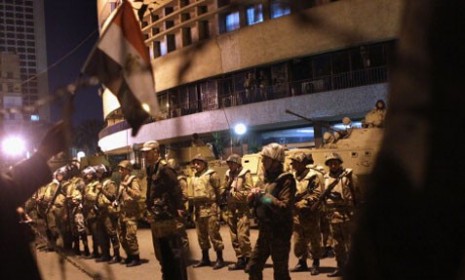Military rule: The biggest threat to Egyptian democracy
The West is worried about the Muslim Brotherhood, but it should be just as concerned about Egypt's armed forces taking power, says Ellis Goldberg in Foreign Affairs

A free daily email with the biggest news stories of the day – and the best features from TheWeek.com
You are now subscribed
Your newsletter sign-up was successful
In the wake of President Hosni Mubarak's resignation, Egyptian protesters are celebrating their victory — but the next steps in the country's transition remain unclear. "The West may be worried that the crisis will bring democracy too quickly to Egypt and empower the Muslim Brotherhood," writes Ellis Goldberg in Foreign Affairs. But "the real concern" should be the prospect that the new government will expel only corrupt civilian members, leaving the military in control. That, says Goldberg, would complete a "slow-motion coup" that effectively began in 1952 and sped up in recent weeks, as Egypt's armed forces went from "applauded bystander to steering force" in the uprising. Here, an excerpt from Goldberg's argument:
"Today, the army presents itself as a force of order and a neutral arbiter between contending opponents, but it has significant interests of its own to defend, and it is not, in fact, neutral. The basic structure of the Egyptian state as it now exists has benefited the military. The practical demands of the protesters seem fairly simple: end the state of emergency, hold new elections, and grant the freedom to form parties without state interference. But these demands would amount to opening up the political space to everyone across Egypt's social and political structure. That would involve constitutional and statutory changes, such as reforming Egypt as a parliamentary rather than a presidential system, in which a freely elected majority selects the prime minister (who is now appointed by the president). These changes would wipe away the power structure the army created in 1952 and has backed since....
...the army may step in as a transitional power and recognize that, as much as it might like to, it cannot return to complete control. The Egyptian military is far more professional and educated than it was in the 1950s, so many officers may recognize the benefits of a democracy. More likely, however, is the culmination of the slow-motion coup and the return of the somewhat austere military authoritarianism of decades past.
The Week
Escape your echo chamber. Get the facts behind the news, plus analysis from multiple perspectives.

Sign up for The Week's Free Newsletters
From our morning news briefing to a weekly Good News Newsletter, get the best of The Week delivered directly to your inbox.
From our morning news briefing to a weekly Good News Newsletter, get the best of The Week delivered directly to your inbox.
Read the entire story in Foreign Affairs.
A free daily email with the biggest news stories of the day – and the best features from TheWeek.com
-
 The ‘ravenous’ demand for Cornish minerals
The ‘ravenous’ demand for Cornish mineralsUnder the Radar Growing need for critical minerals to power tech has intensified ‘appetite’ for lithium, which could be a ‘huge boon’ for local economy
-
 Why are election experts taking Trump’s midterm threats seriously?
Why are election experts taking Trump’s midterm threats seriously?IN THE SPOTLIGHT As the president muses about polling place deployments and a centralized electoral system aimed at one-party control, lawmakers are taking this administration at its word
-
 ‘Restaurateurs have become millionaires’
‘Restaurateurs have become millionaires’Instant Opinion Opinion, comment and editorials of the day